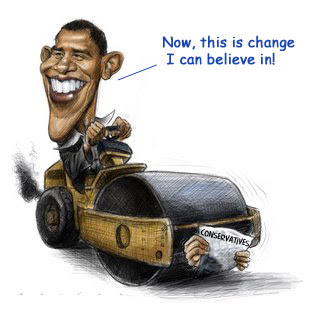
I believe there are two types of religion.
1. Honest religions - Those that tell you up front what they believe and what it will cost you before you join up and leave it up to you as to whether to become a member. Then, they let you go whenever you want to part company with them - no hard feelings.
2. Dishonest religions - Those that won't tell you what they really believe till they already have you signed up, that use fear-mongering or other forms of pressure to induce you to join up and either won't let you go or punish you for leaving.As far as I'm concerned any formalized system of belief, a significant portion of which must be taken on faith, is a religion. This includes atheism, agnosticism, liberalism, socialism, environmentalism and (Heaven help me) conservatism. Various religions have greater or lesser percentages of their beliefs that are based on fact or faith.
My friends on the left claim their articles of faith are entirely based on fact. The problem is, I can't seem to pin them down on anything you could actually identify as fact or faith-based. Instead you get statements like:
"Things are bad. We have to do SOMETHING!"
"The people are tired of 8 years of failed policies - they want CHANGE!"
"Only the government can save us."
"If we don't do something the planet will die."
The problem with all of these statements is they assume a disaster is coming and that doing something about it will help.
So the next thing they say is: "Well, we have to do something!"
Why?
Why must we do something? Why do we need to meddle? Why don't we let everybody fix their own little corners of the world? Will things not inevitably get better if all of us individually get better? This makes sense to me.
I do realize that leaving it alone doesn't satisfy the need to scratch that folks have who love power and position. Even though our Mom's told us we shouldn't "pick at it", we do anyway!
When I challenge members of the Obama nation, I get counseled to 'give him a chance'. Why should I? I believe that he wants to do things that are bad for the country. If he does something good for the country, I'll praise him. But why would I want to wait for him to fail before opposing him? If he fails, he takes us with him!
If I had a headache and someone pointed a gun at my head and said, "Hold still. I'm going to shoot a hole in your head. You'll feel much better."
How should I react to this proposal? After all, it's still only a proposal. Should I give it a chance? Should I wait till he ventilates my skull or should I do a quick duck, bob and weave.
Me, I'm from the "bob and weave" school. Same with the approach the president and congress have proposed. I think it's going to be about as effective as putting a bullet through out collective heads. I think we need to avoid this if at all possible.
The guys on the left may complain about my not "giving it a chance" on the grounds that they haven't really said what they are going to do yet. Well, it's true they've danced around the issues pretty well, but we can identify some pretty basic beliefs common to most members of this ragtag alliance of atheists, spiritualists, environmentalists, socialists and new age Christians. They seems to share a new religion - one they believe that Americans have elected to govern the country. These are some of the tenets of that faith that I have teased from all the rhetoric from the politicians, the pundits and true-believer bloggers:
1. That the planet is dying from global warming caused by man
2. That man can and must do something about it or the planet will die.
3. That a massive change in our behavior will fix global warming
4. That we must do something to fix the economy or everything will collapse and probably permanently if we don't do it right now -you don't need to look to closely at the details (see principle #10).
5. That spending a bunch of money on social programs will "fix" the economy
6. That the government must take over the health care system or it will collapse unless it does.
7. That Democrats are incorruptible and can be trusted to take good care of you if you give them more power and authority.
8. That centralized power and planning will work better than decentralized power; that more regulation is better for us than less regulation.
9. That government control of the auto industry, the banking industry, the energy industry and the health care industry is a good thing.
10. That government controlled by Democrats is inherently good and benign and you can trust the Democrat party with your money, your health, your job and your freedom.
So, tell me where I'm wrong.
What part of that don't you guys on the left believe? Because if you believe any or all of the 10 things listed above, I think you're crazy and shouldn't be running the country. I don't find a shred of reliable evidence that indicates that a single one of these ideas works or even makes sense.
Most of the argument I get from people on the left is that we should believe all these ideas; that they have been proved beyond doubt and everybody knows it. Now, the left would never lay out the above tenets of their religion in anything like this clarity. These are ideas that are repugnant to many Americans and have cost Democrats their seats in government when some enterprising conservative has pinned one of the tenets on them.
That's why I say that the new religion is dishonest. It doesn't tell you what it really believes. Instead it tells you that anyone who disbelieves is wrong, that everybody believes the new religion and pressures you to serve it. It tells you that the planet will die and the economy will collapse if you don't let the new religion have it's way.
So tell me which of these 10 tenets of faith is not what you believe. If you think I should support Obama's agenda, then as near as I can figure out, these are ideas that he and his supporters ask me to believe and accept by faith. Is this what you mean by hope and change?
If so, I'm still convinced I should oppose Obama's agenda.
I'm just sayin'
Tom













